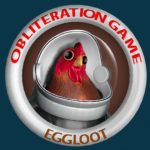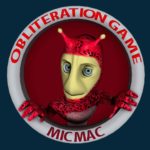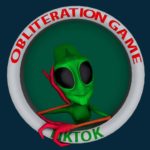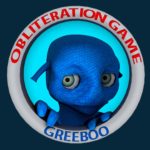Developer/Publisher: Freekstorm || Overall: 8.0/10
What were you doing seven years ago? If I remember correctly, I was probably in the middle of watching every Star Trek series on Netflix. There’s some stuff I was doing on Squackle back then, like posting Jokes and posting some chats I was having on Chatroulette, apparently. In the mean time, developer Freekstorm had an idea for a space-themed puzzle game that had a game show feel to it and spent the next seven years making it, and eventually releasing in late July 2017. In the meantime, Squackle still exists and I’ve seen every episode of Star Trek — quite an accomplishment for both of us, I suppose.
Doctor Kvorak’s Obliteration Game took seven years to make. Seven years is a long time to spend on one game, one concept, and a special kind of motivation was required to get it to release day. This title seethes “passion project” through and through, and with a little research into the title I was able to find some history on its development, including presentations given by its developers, which gives you a nice insight into how the game came into existence.
Filled with puns, and occasionally written in verse, Doctor Kvorak’s game show he runs, making you choose what to do with the universe.
The theme is what kept my interest throughout — a game show taking place in space, hosted by an all-powerful being known as Doctor Kvorak. “Liberate or Obliterate” is the tagline of the “game show” as you decide the fate of a planet Doctor Kvorak chooses; often times populated by worthless-sounding beings. You participate as the character Greeboo from the Planet Noo, and later on, eventually find his “friends” whom you will also control. While Greeboo is just a vessel for you, the player, the real characters of the game are Doctor Kvorak himself and a hen in an astronaut suit named Eggloot. The titular character Doctor Kvorak is the antagonist, and sounds like some sort of weird German stereotype added with a Japanese stereotype; subtitles are really required to understand every word he’s saying. Eggloot is not necessarily a protagonist but antagonizes the antagonist, as they go back and forth with strange writing that all rhymes. Much of the “story” hits on the same points over and over: Doctor Kvorak is an evil omnipotent being, and Eggloot is the thorn in his side. There’s not much in the way of story progression, because you’re going through about fifteen levels of the same formula, but it is all funny/entertaining in the context of the game.
The script is oddly clever at times, and a lot of effort went into the rhyming. There wasn’t a whole lot of lazy rhymes as far as I could tell, so it really kept up the “charm” in a fairy tale sort of way despite all of the space shit going on. They slip in and out of the verse dialogue, so it isn’t kept up the entire time, which prevents the rhyming from getting old. Another interesting thing that happens is Doctor Kvorak talks right into the camera most of the time, towards the player, rather than at Greeboo, who is acknowledged separately. It gives it a strange “breaking the fourth wall” aspect here as if you are an observer rather than a participant, even though you are controlling a character.
Despite the interesting theme, the gameplay itself is basic. The puzzles are pretty easy, most are solved with little trouble. Slow-moving characters draw out the length of game despite the easy puzzles, so the easy-to-figure-out steps take like five minutes to execute rather than one or two. The puzzle variety is a mix of switches, moving boxes, swapping things around, platforming, and avoiding death. A large part of the challenge is also in collecting items; there are 50 collectible items (for what purpose I’m not sure) and also 10 pieces of the planet you are trying to save — which seems to be the only actually important thing to collect. Once you find your friends, you will switch off between the characters to work your way through more elaborate puzzles. They also each have their own unique set of power-ups that are used in that pursuit.
Most of the puzzles are compartmentalized, meaning you don’t want to go too far ahead before you collect or solve the puzzle for the thing you just saw. Though, there are times where you’ll loop back around, depending on the level design. It also seems like you can complete puzzles in ways that aren’t necessarily intended, and I’m not entirely sure that was meant to be. For example, you can “climb” up a box by pushing it and jumping it at the right angle and velocity, allowing you to access higher platforms. There’s usually some sort of other puzzle piece that allows you to do this a lot easier after doing some other task. Another example is how you can use a bunch of boxes to block a laser gun and get an item, when what they really wanted you to do was simply find the switch and turn the laser gun off. It seems too accidental to be intentional, otherwise more puzzles could be completed “in an unintended way.” There is also optional VR support, and that seems to add something to the formula, but I don’t have that equipment so I can’t try it.
Character animation is not great, but oddly charming since they are “aliens.” There are some physics-based animations that are triggered when you fall from a high ledge, or somehow trip. Cosmetics are a curious addition, and you collect a lot of them. Most of the outfits are made for Greeboo, it seems, but they serve no real game purpose other than mixing up what you are looking at on the screen. Otherwise, the puzzle elements look okay and achieve a certain style, almost reminding me of American Gladiators or one of those other ridiculous-looking physical challenge game shows, except… taking place in space.
The game runs smooth at the default settings. I had increased the sliders to the maximum at one point but couldn’t tell much difference except for in the shadows. I encountered only one crash after I had increased everything to max; when I launched again the settings were back to default, so I left it there. Otherwise, there haven’t been many other technical issues.
The soundtrack is a notably positive part of the game. The music mostly goes with the theme and they’re pretty catchy tunes, which is important since you’ll hear them over and over. It is hard to pick out how many songs there actually are, but there appear to be 17 according to Steam. They may slowly get put into the rotation as you get further in levels, so it is hard to tell just how many songs I was hearing at any given time. Since each level was taking me on average thirty minutes to complete, I felt like I was hearing the same songs.
Unfortunately, the theme of “Liberate or Obliterate” is predetermined. You have to save every planet to eventually progress to the next set of levels. It would have been more fun to have some sort of long-term consequence depending on how diligent you were in collecting all of the planet pieces. Instead you’ll have to replay an entire level and do it right when you miss even just one piece of a world. The “overworld” is split into three segments, with about six levels on each platform. They also included a level creator which was sort of hard to futz around with, and wasn’t as intuitive as it needed to be to make it worth using. Seemed like it may have been some sort of default level-maker included within Unity, but I couldn’t be sure since I’m not experienced with the inner workings of the engine. There weren’t any other Community maps available, or maybe the feature wasn’t working at all since I couldn’t see anything available.
Overall, the game is not awful, and if I was 12 or 13 this might have been a lot of fun if I was playing it as an entry-level puzzle game. The puzzle elements are light (perhaps the VR support had something to do with that, I’m not sure), the theme is fun, the characters are “unique” and there is some replayability if you so desired to do speed runs. The novelty of the title doesn’t really wear off, but the puzzles might be too easy for older players to keep their interest.
Doctor Kvorak’s Obliteration Game is available on Steam.































One thought on “Doctor Kvorak’s Obliteration Game (PC) Review”